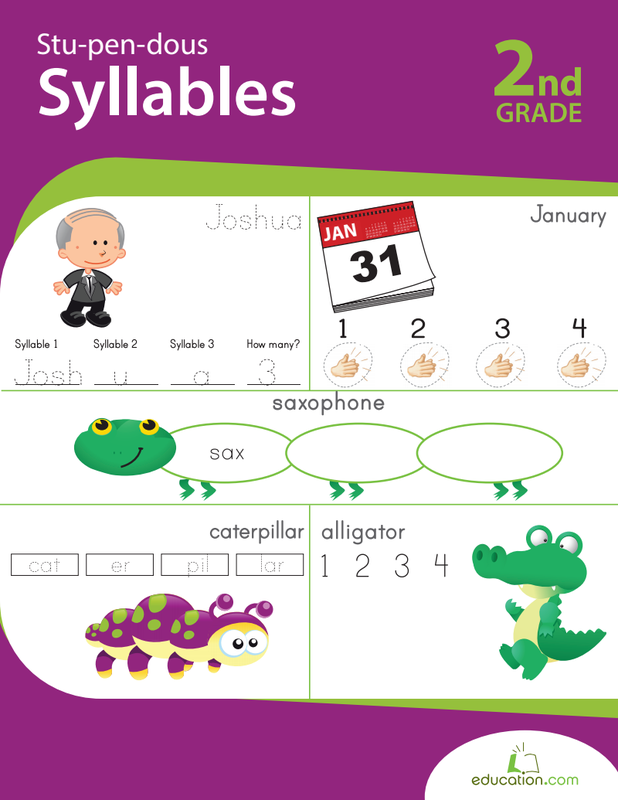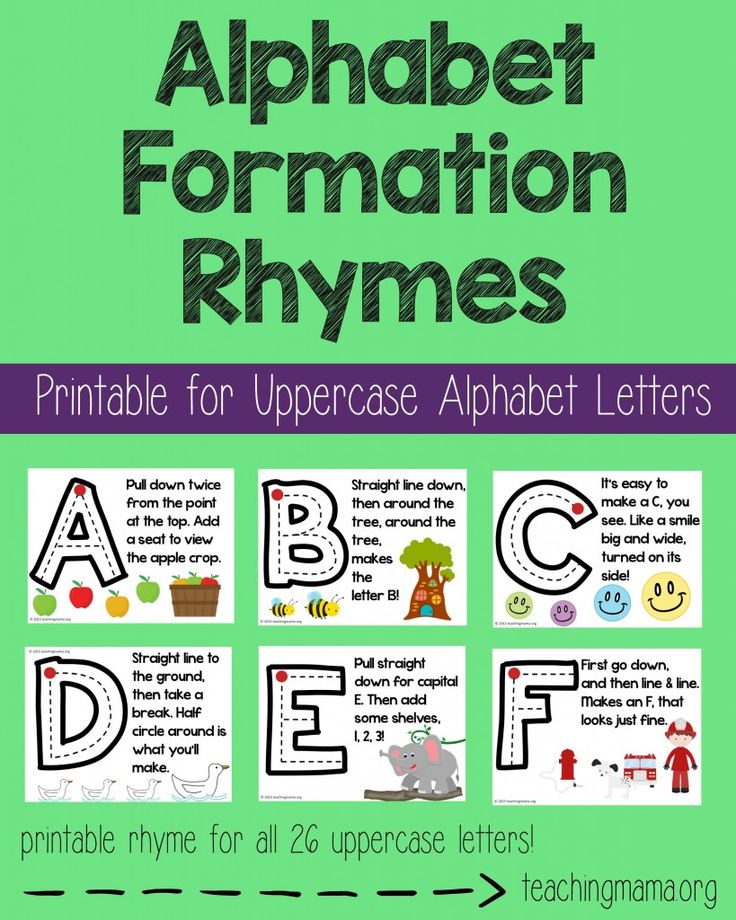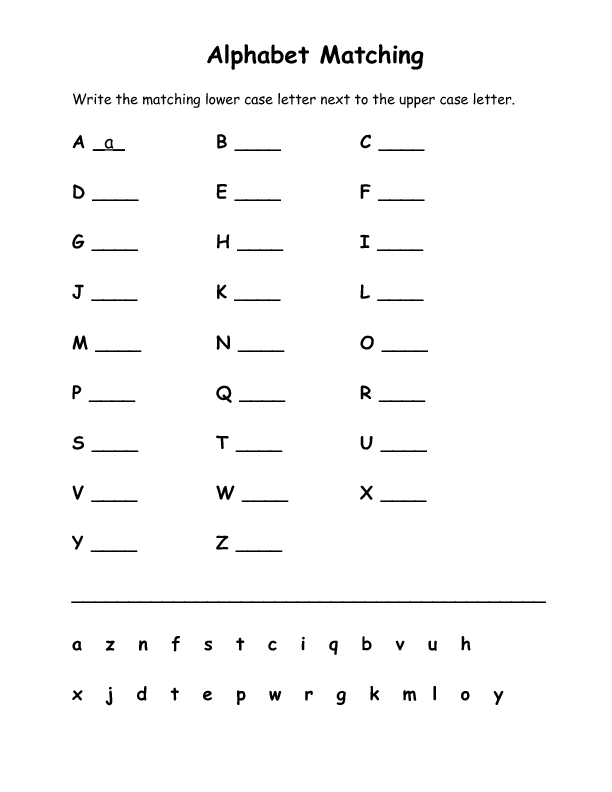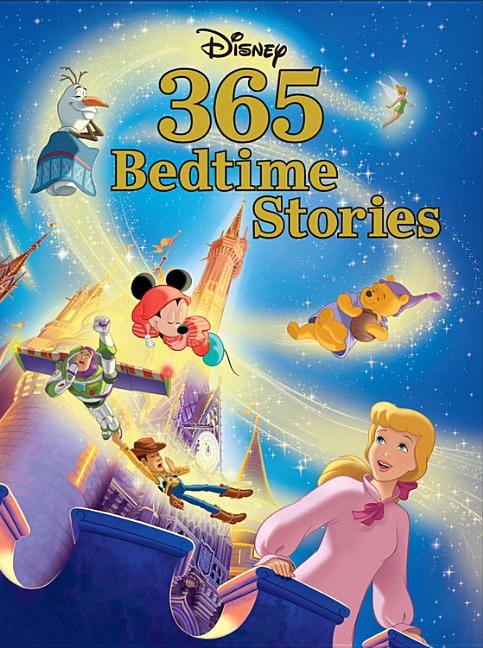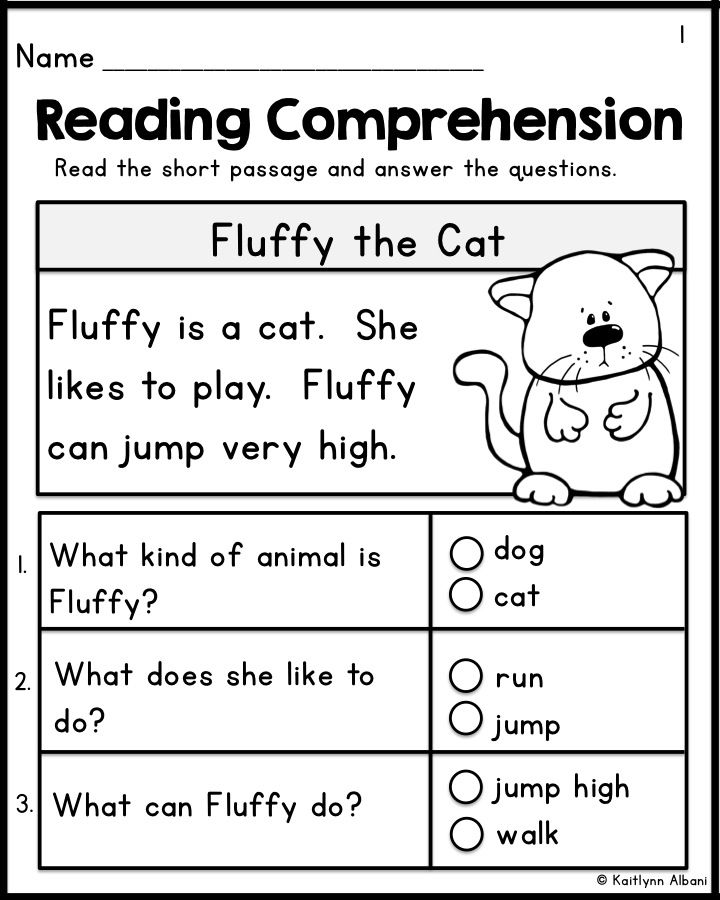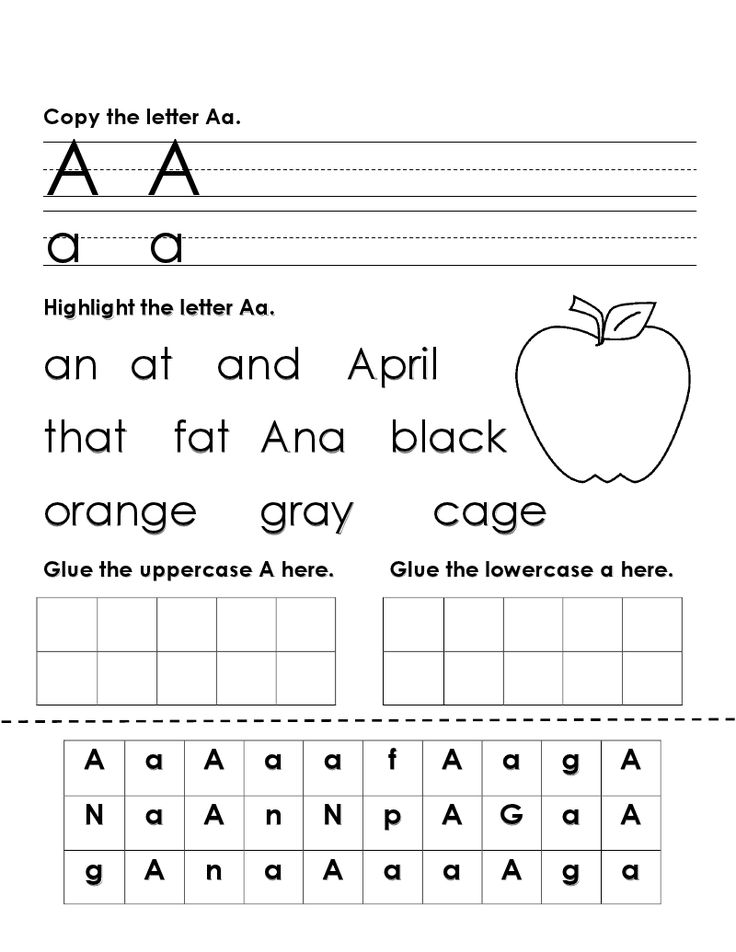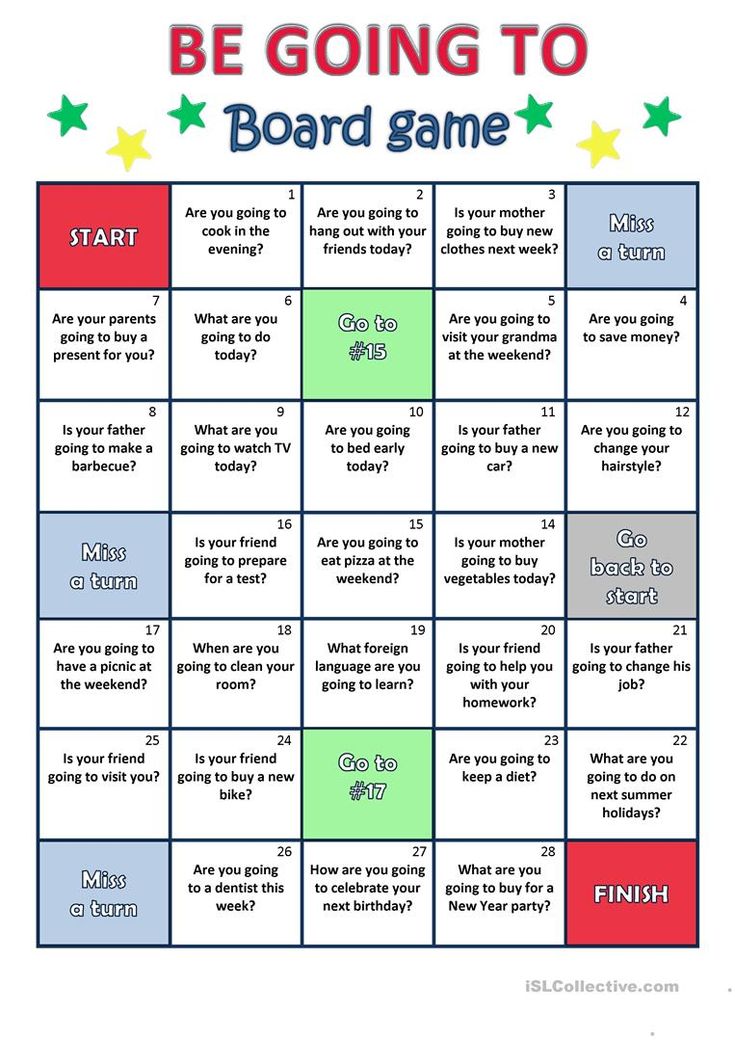How to help your child in reading
Tips to Help Children Learn to Read
Written by Dayva Segal
In this Article
- Read Out Loud to Your Children
- Other Tips to Help Your Children Learn to Read
- What to Do if Your Child Is Having Trouble With Reading
Reading is an important skill that children will use daily for the rest of their lives. While many children learn to read at school, parents can enhance the experience by offering support at home. This support can begin as soon as your child is born.
Read Out Loud to Your Children
Experts agree that reading out loud to your children is the best way to help them learn to read. Start when your child is a newborn baby and continue throughout childhood. As a baby, your child is primed to learn the skills that will help them learn to read as they get older.
To make reading out loud as effective as possible, make sure to:
- Read age-appropriate books. Babies, for example, enjoy board books that they can touch and play with.
Older children may enjoy "big books" that help them to see differences in words and letters.
- Use silly voices and voice effects. This helps your children to engage with the story and feel excited about reading time.
- Point to words as you read so your child can follow along. Doing this helps solidify the idea that words are where the story comes from.
- Talk about the pictures. Ask your child to name what they see in the pictures and talk about what the images show as it relates to the story.
- Relate the story to life. Show your child how things in the book relate to things that happen in real life.
- Answer questions. If your child asks a question, stop and answer it. That will keep them engaged and interested.
- Read more difficult books. Once your child learns to read, keep reading out loud to them. You can read books that are above their reading level to encourage further improvement in their reading level.

Other Tips to Help Your Children Learn to Read
Besides reading out loud to your children, there are other things you can do to encourage literacy.
- Listen to your child read out loud. Once they learn to read, encourage them to read to you. This helps them build confidence in reading. The goal with reading aloud is for your child to understand the story. So if they need help pronouncing a word, tell them how it's said instead of making them sound it out — that way, they don't lose their place or the meaning of the sentence. If your child accidentally uses a word that doesn't make sense, have them go back and reread the sentence.
- Praise your child's reading. As your child learns reading, offering praise helps them gain confidence.
- Make reading time part of your daily routine. Daily reading time creates a routine that lets your child know reading is part of everyday life. Many families choose bedtime as their preferred reading time.
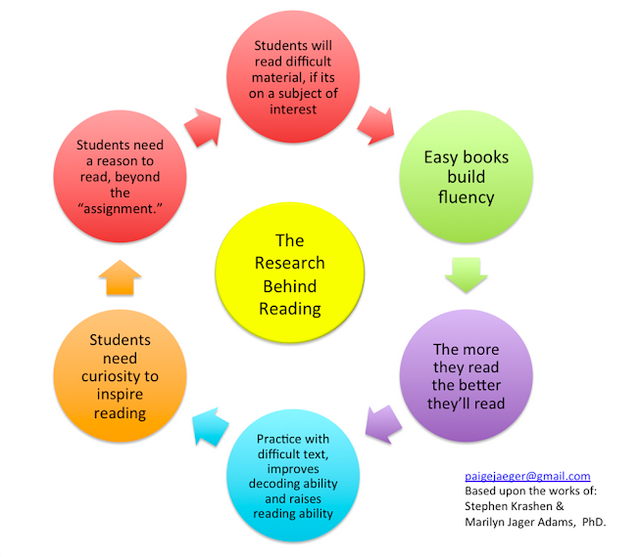
- Leave books in your kid's bedroom. That way, they can look at them and enjoy them whenever they want.
- Let your child complete sentences. If your child learns the words in their favorite books, let them finish the sentences or "read" the whole book out loud.
- Read books your child likes. This helps them to engage with reading time and enjoy it more.
- Remember, anyone can teach reading. Some parents think that only teachers can teach reading to children. But parents can, too. Reading is an essential life skill.
- Be patient. If your child shows no interest in a book, don't force it. If your child tries to write a word and gets a letter wrong, they still deserve praise. Patience and praise are more helpful for a child's learning to read than getting frustrated or yelling.
- Talk to your children. Exposing your child to new words and language can help their literacy skills.
 Talking to your baby a lot, for example, can help them become better readers later on.
Talking to your baby a lot, for example, can help them become better readers later on. - Encourage writing. Writing is part of literacy. Provide writing tools like crayons, pencils, and markers. Encourage your child to write, even if it's just scribbling. One idea is to write your child a letter and ask them to write one back.
- Have your child tell you a story and write it down. Ask your child to tell you a simple story. Write it down and then read it back to them while pointing at the words.
- Teach your child phonics. There are countless products available that help children learn the sounds that are associated with letters. This helps them to sound out words as they are learning to read. You can also just use paper and a pencil to help them learn this skill. Research shows that when children don't know phonics, they struggle more with reading.
- Avoid "leveled" reading programs.
 Some people believe that children who get frustrated by reading difficult material will get turned off by reading. But experts say that children learn more when they're exposed to more challenging reading material. Easy-level books often train children to rely on word memorization because they often use the same words over and over. They also train children to rely more on pictures. That can lead to slower reading development. It's best if children are exposed to a variety of challenges in their reading materials.
Some people believe that children who get frustrated by reading difficult material will get turned off by reading. But experts say that children learn more when they're exposed to more challenging reading material. Easy-level books often train children to rely on word memorization because they often use the same words over and over. They also train children to rely more on pictures. That can lead to slower reading development. It's best if children are exposed to a variety of challenges in their reading materials. - Talk to teachers. Ask your child's teachers about their reading program and how they teach literacy. Look for them to include phonics, reading out loud in class, vocabulary, and writing practice.
What to Do if Your Child Is Having Trouble With Reading
If your child's reading is not progressing, you should work with their school to get testing done. That way, you can find out if your child has a learning difficulty or difference, or if it's simply that the reading program in their class doesn't work for them.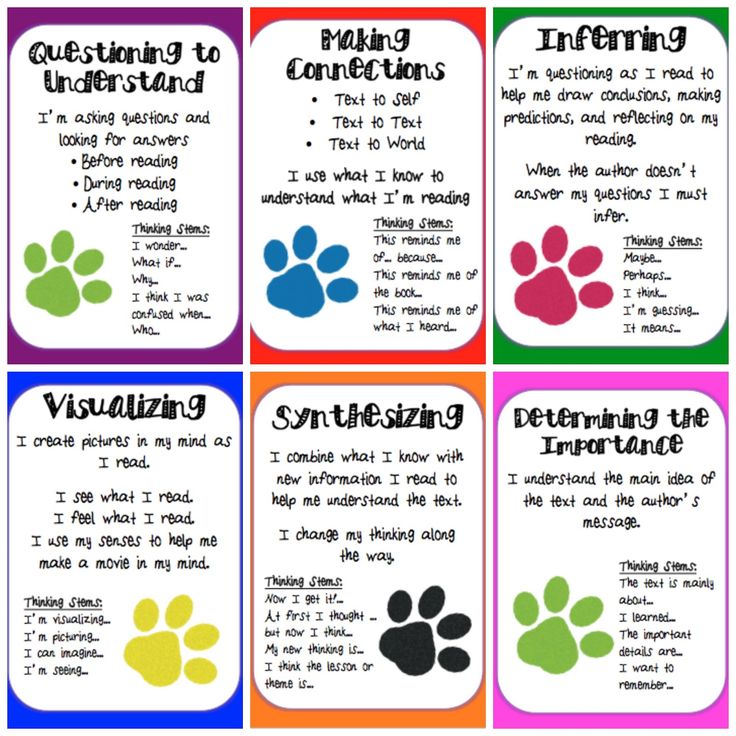 If your child does get diagnosed with a learning difference, like dyslexia, they're entitled to receive extra services from their school for free.
If your child does get diagnosed with a learning difference, like dyslexia, they're entitled to receive extra services from their school for free.
You can also hire a tutor to help your child improve their reading. Free tutoring may be available for students from low-income families.
At home, provide ongoing emotional support to keep your child from getting discouraged.
11 Ways Parents Can Help Their Children Read
Parents often ask how they can help their children learn to read; and it’s no wonder that they’re interested in this essential skill. Reading plays an important role in later school success. One study even demonstrates that how well 7-year-olds read predicts their income 35 years later!
Here are 11 practical recommendations for helping preschoolers and school-age students learn to read.
1. Teaching reading will only help.
Sometimes, parents are told early teaching is harmful, but it isn’t true. You simply can’t introduce literacy too early.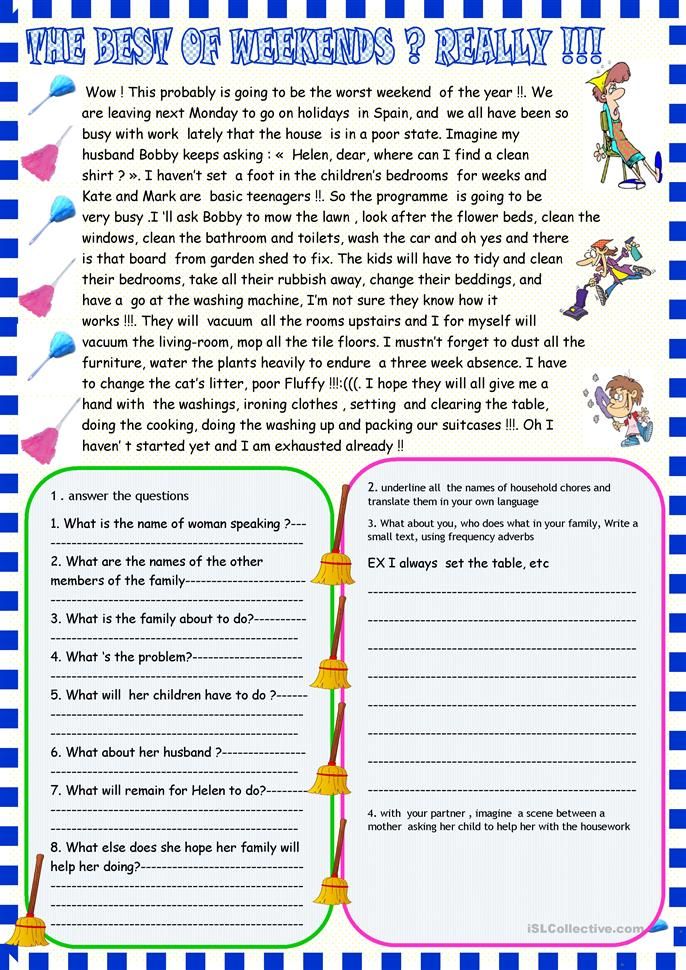 I started reading to my own children on the days they were each born! The “dangers of early teaching” has been a topic of study for more than 100 years, and no one has ever found any convincing evidence of harm. Moreover, there are hundreds of studies showing the benefits of reading to your children when they are young.
I started reading to my own children on the days they were each born! The “dangers of early teaching” has been a topic of study for more than 100 years, and no one has ever found any convincing evidence of harm. Moreover, there are hundreds of studies showing the benefits of reading to your children when they are young.
2. Teaching literacy isn’t different than teaching other skills.
You don’t need a Ph.D. to raise a happy, healthy, smart child. Parents have been doing it for thousands of years. Mothers and fathers successfully teach their kids to eat with a spoon, use a potty, keep their fingers out of their noses, and say “please.” These things can be taught pleasantly, or they can be made into a painful chore. Being unpleasant (e.g. yelling, punishing, pressuring) doesn’t work, and it can be frustrating for everyone. This notion applies to teaching literacy, too. If you show your 18-month-old a book and she shows no interest, then put it away and come back to it later. If your child tries to write her name and ends up with a backwards “D,” no problem. No pressure. No hassle. You should enjoy the journey, and so should your child.
If your child tries to write her name and ends up with a backwards “D,” no problem. No pressure. No hassle. You should enjoy the journey, and so should your child.
3. Talk to your kids (a lot).
Last year, I spent lots of time with our brand new granddaughter, Emily. I drowned her in language. Although “just a baby,” I talked — and sang — to her about everything. I talked about her eyes, nose, ears, mouth, and fingers. I told her all about her family — her mom, dad, and older brother. I talked to her about whatever she did (yawning, sleeping, eating, burping). I talked to her so much that her parents thought I was nuts; she couldn’t possibly understand me yet. But reading is a language activity, and if you want to learn language, you’d better hear it, and eventually, speak it. Too many moms and dads feel a bit dopey talking to a baby or young child, but studies have shown that exposing your child to a variety of words helps in her development of literacy skills.
4. Read to your kids.

I know everyone says this, but it really is a good idea — at least with preschoolers. One of my colleagues refers to this advice as the “chicken soup” of reading education. We prescribe it for everything. (Does it help? It couldn’t hurt.) If a parent or caregiver can’t read or can’t read English, there are alternatives, such as using audiobooks; but for those who can, reading a book or story to a child is a great, easy way to advance literacy skills. Research shows benefits for kids as young as 9-months-old, and it could be effective even earlier than that. Reading to kids exposes them to richer vocabulary than they usually hear from the adults who speak to them, and can have positive impacts on their language, intelligence, and later literacy achievement. What should you read to them? There are so many wonderful children’s books. Visit your local library, and you can get an armful of adventure. You can find recommendations from kids at the Children’s Book Council website or at the International Literacy Association Children's Choices site. [Reading Rockets also provides guidance and lots of themed booklists in our Children's Books & Authors section.]
[Reading Rockets also provides guidance and lots of themed booklists in our Children's Books & Authors section.]
5. Have them tell you a “story.”
One great way to introduce kids to literacy is to take their dictation. Have them recount an experience or make up a story. We’re not talking “Moby Dick” here. A typical first story may be something like, “I like fish. I like my sister. I like grandpa.” Write it as it is being told, and then read it aloud. Point at the words when you read them, or point at them when your child is trying to read the story. Over time, with lots of rereading, don’t be surprised if your child starts to recognize words such as “I” or “like.” (As children learn some of the words, you can write them on cards and keep them in a “word bank” for your child, using them to review later.)
6. Teach phonemic awareness.
Young children don’t hear the sounds within words. Thus, they hear “dog,” but not the “duh”-“aw”- “guh.” To become readers, they have to learn to hear these sounds (or phonemes).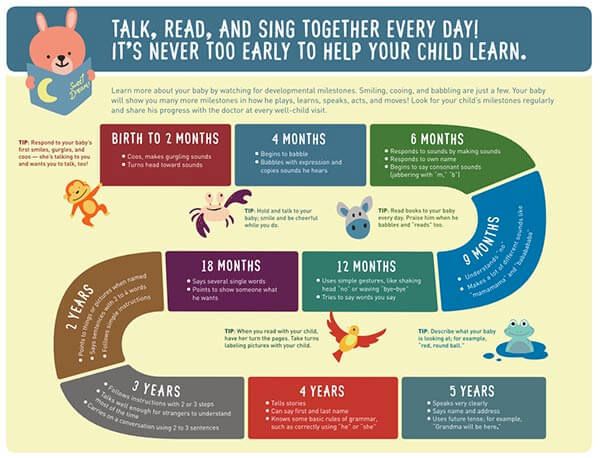 Play language games with your child. For instance, say a word, perhaps her name, and then change it by one phoneme: Jen-Pen, Jen-Hen, Jen-Men. Or, just break a word apart: chair… ch-ch-ch-air. Follow this link to learn more about language development milestones in children.
Play language games with your child. For instance, say a word, perhaps her name, and then change it by one phoneme: Jen-Pen, Jen-Hen, Jen-Men. Or, just break a word apart: chair… ch-ch-ch-air. Follow this link to learn more about language development milestones in children.
7. Teach phonics (letter names and their sounds).
You can’t sound out words or write them without knowing the letter sounds. Most kindergartens teach the letters, and parents can teach them, too. I just checked a toy store website and found 282 products based on letter names and another 88 on letter sounds, including ABC books, charts, cards, blocks, magnet letters, floor mats, puzzles, lampshades, bed sheets, and programs for tablets and computers. You don’t need all of that (a pencil and paper are sufficient), but there is lots of support out there for parents to help kids learn these skills. Keep the lessons brief and fun, no more than 5–10 minutes for young’uns. Understanding the different developmental stages of reading and writing skills will help to guide your lessons and expectations.
8. Listen to your child read.
When your child starts bringing books home from school, have her read to you. If it doesn’t sound good (mistakes, choppy reading), have her read it again. Or read it to her, and then have her try to read it herself. Studies show that this kind of repeated oral reading makes students better readers, even when it is done at home.
9. Promote writing.
Literacy involves reading and writing. Having books and magazines available for your child is a good idea, but it’s also helpful to have pencils, crayons, markers, and paper. Encourage your child to write. One way to do this is to write notes or short letters to her. It won’t be long before she is trying to write back to you.
10. Ask questions.
When your child reads, get her to retell the story or information. If it’s a story, ask who it was about and what happened. If it’s an informational text, have your child explain what it was about and how it worked, or what its parts were.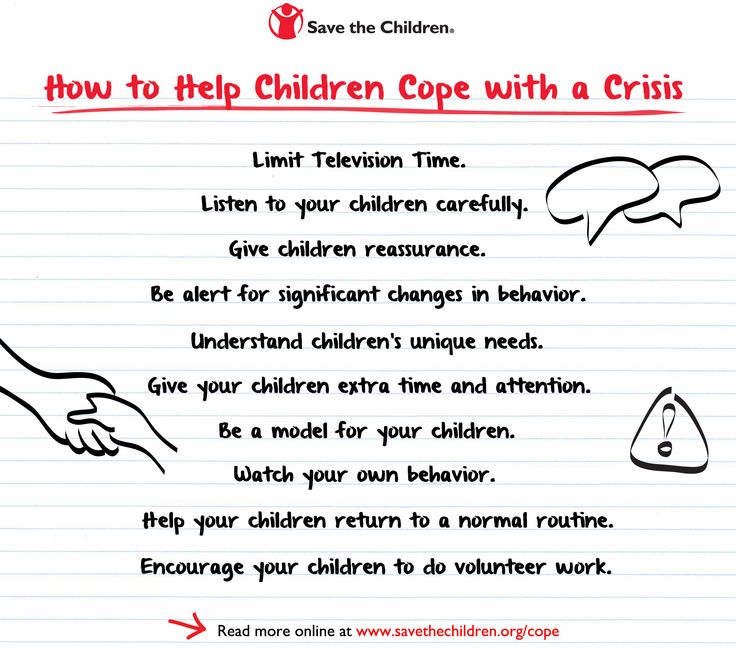 Reading involves not just sounding out words, but thinking about and remembering ideas and events. Improving reading comprehension skills early will prepare her for subsequent success in more difficult texts.
Reading involves not just sounding out words, but thinking about and remembering ideas and events. Improving reading comprehension skills early will prepare her for subsequent success in more difficult texts.
11. Make reading a regular activity in your home.
Make reading a part of your daily life, and kids will learn to love it. When I was nine years old, my mom made me stay in for a half-hour after lunch to read. She took me to the library to get books to kick off this new part of my life. It made me a lifelong reader. Set aside some time when everyone turns off the TV and the web and does nothing but read. Make it fun, too. When my children finished reading a book that had been made into a film, we’d make popcorn and watch the movie together. The point is to make reading a regular enjoyable part of your family routine.
Happy reading!
Sources:
Ritchie, S.J., & Bates, T.C. (2013). Enduring links from childhood mathematics and reading achievement to adult socioeconomic status.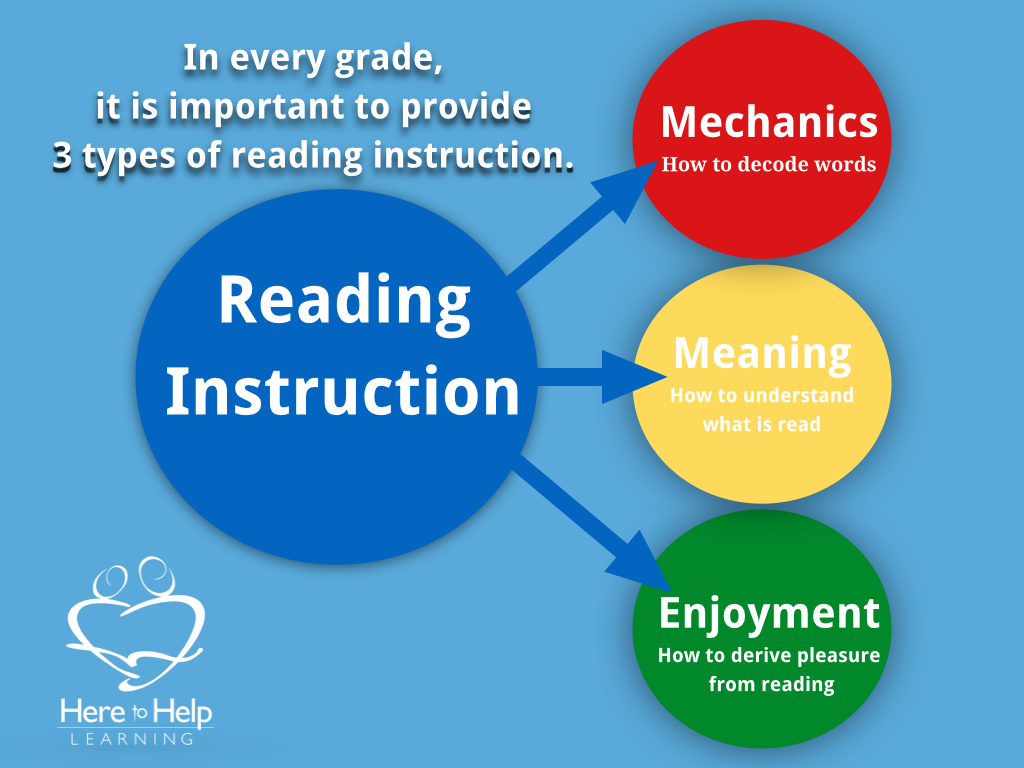 Psychological Science, 24, 1301-1308.
Psychological Science, 24, 1301-1308.
Karass J., & Braungart-Rieker J. (2005). Effects of shared parent-infant reading on early language acquisition. Journal of Applied Developmental Psychology, 26, 133-148.
How to help your child fall in love with reading? 10 tips from a psychologist.
Do you notice how rare it is now to meet people reading, for example, in transport?
But, it would seem, now with the advent of numerous electronic "readers" everything has become much easier. It is easier to get the right book, easier to carry it with you not in the form of a pood volume, but in the form of a miniature device. But for some reason, the majority prefers to drive some ball or shoot on the same device. It's easier. You don't have to think. nine0004
Reading is a labor intensive process. After all, it is necessary not only to put letters into words, and words into sentences, but also to understand the meaning. And most importantly, create an image of what you read in your own mind.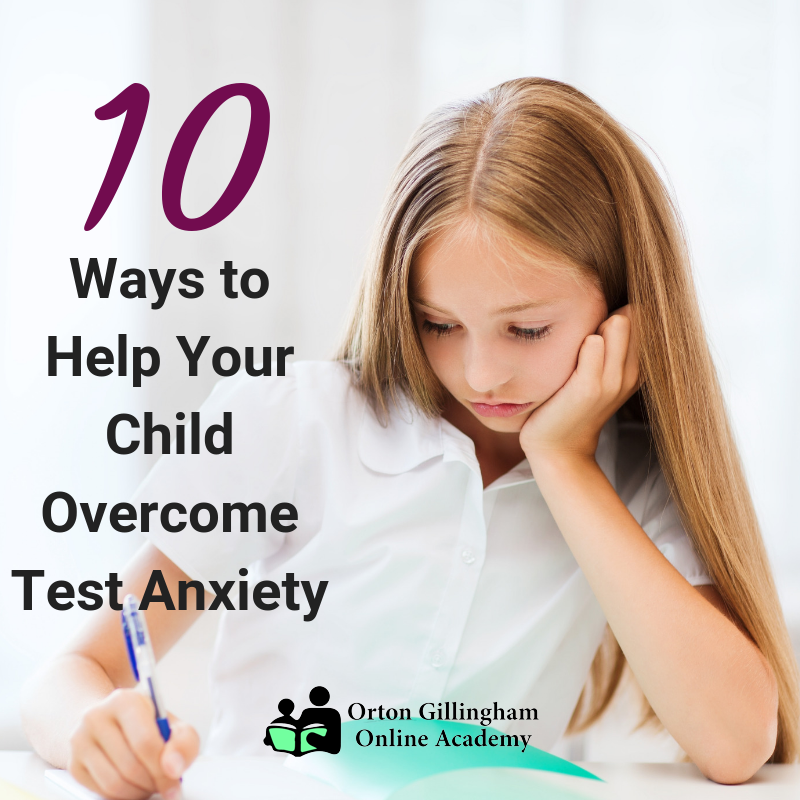 For a person, especially a child, who is used to receiving ready-made images from TV, this is a difficult job, because his imagination is not trained.
For a person, especially a child, who is used to receiving ready-made images from TV, this is a difficult job, because his imagination is not trained.
Even if the majority of adults prefer entertainment "for free", what can be demanded from a child for whom even the very process of folding letters into words is still difficult? nine0004
There are two reasons for this plight of reading - the easily accessible entertainment of television images and, oddly enough, the school. Often reading books from the compulsory school curriculum is perceived by the child as meaningless and hard work. How can we solve this problem, how can we help the child fall in love with literature and enjoy it? After all, people who do not read have poorer speech, as a rule, their imagination is not developed, and they write less competently.
Here are 10 tips to help you:
1. First of all, create a culture of reading in your home.
If a child does not see you enjoying a book, then he himself is unlikely to become an active reader.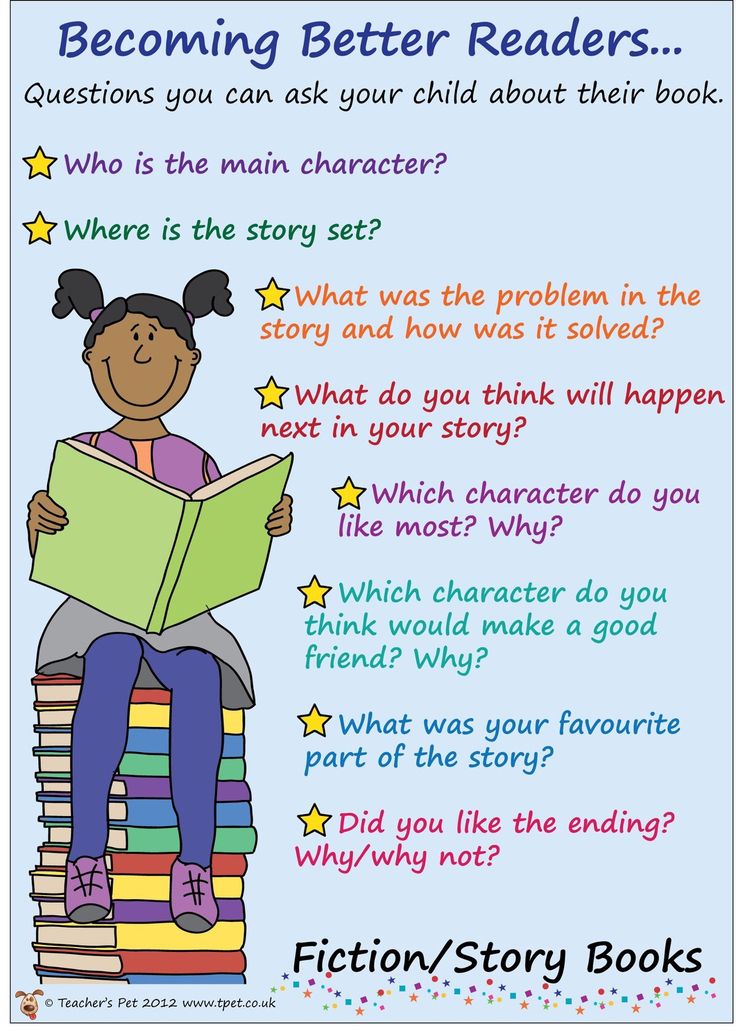 After all, children are taught not by our words, but by our actions.
After all, children are taught not by our words, but by our actions.
2. Family reading aloud.
If possible, involve other family members in this activity. And read to each other. Choose a book on a topic that interests your child. By the way, think about how well you know his interests? nine0003 Do not ask the child to read to you yet, let him only listen if he wants to. You can simply tell him, “Dad found a very interesting book about... (the child's favorite topic) and wants to read it to me. If you want, you can listen too.”
Have a parent read an interesting passage from the book. And then adults can start discussing what they have read among themselves. Ask the child, what does he think?
Thanks to this activity, you will enjoy yourself, improve the atmosphere at home, and show your child that reading is a process that many people enjoy. In addition, while listening, the child develops creative imagination, which will help him in the future.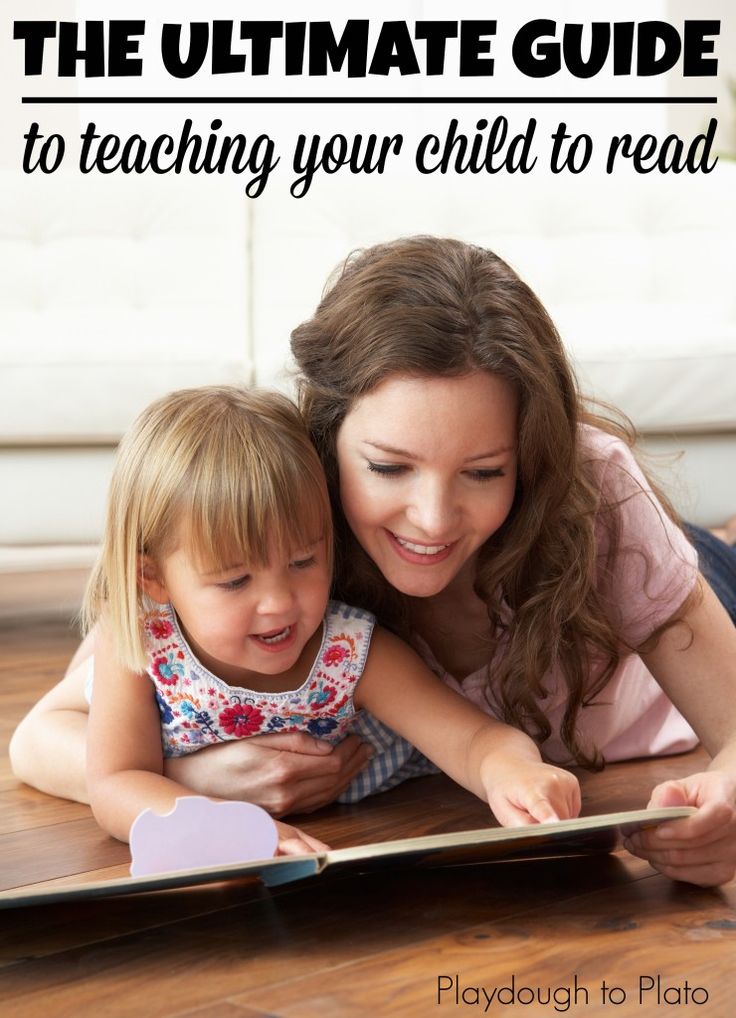 nine0003 And take the time to read aloud to your child. This is not only an introduction to reading. These are moments of closeness that you will remember when the child grows up.
nine0003 And take the time to read aloud to your child. This is not only an introduction to reading. These are moments of closeness that you will remember when the child grows up.
3. Deficit and challenge.
At the initial stage of learning to read, it is very important to do it casually, without any explanations, edifications and requests to the child to read for himself. Better, on the contrary, create a feeling of scarcity and inaccessibility of the book you are interested in, if the child asks for it, you can answer: “I myself want to read more. Okay, I'll give you this book, just for a while, I really want to read for myself what's next. And you still need to do your homework." nine0003 You can even add that the child is still too small for this book, that he will not understand everything. Such a challenge will encourage many children to prove that they are already smart and adults.
In this approach, the most important thing is that you yourself should be interested in this book, because otherwise the child will instantly feel false.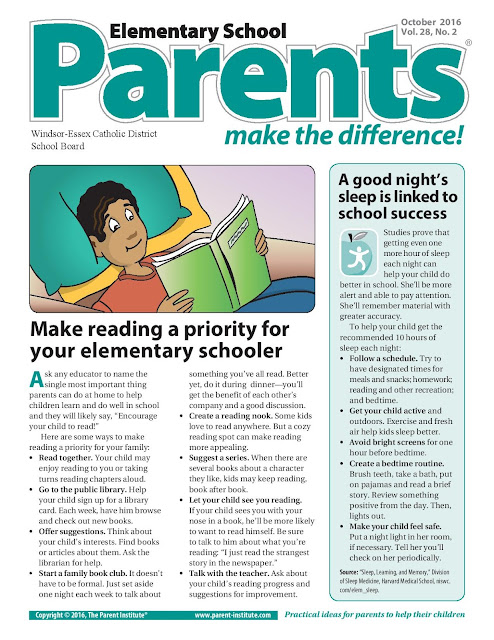
4. Draw illustrations.
Especially while the child is small, draw together with him illustrations for the book you are reading to him. Most children enjoy drawing, especially if you help. This will attract additional attention and love for the book, will provide an opportunity to discuss what the child remembers and impressed. And it will help develop the imagination. nine0004
5. Start easy and fun.
First determine for yourself why you want your child to read? So that he could master the school curriculum, and you wouldn't be ashamed of him? Or do you want to interest him in reading as a source of joy, interest and knowledge?
In the beginning, offer the child books that will be entertainment and joy for him. Which will be easy for him to read, according to his age. Let it be adventure, fantasy, stories about animals or first love - if only the child was interested. And when he loves reading, then it will be possible to offer him something more serious and difficult.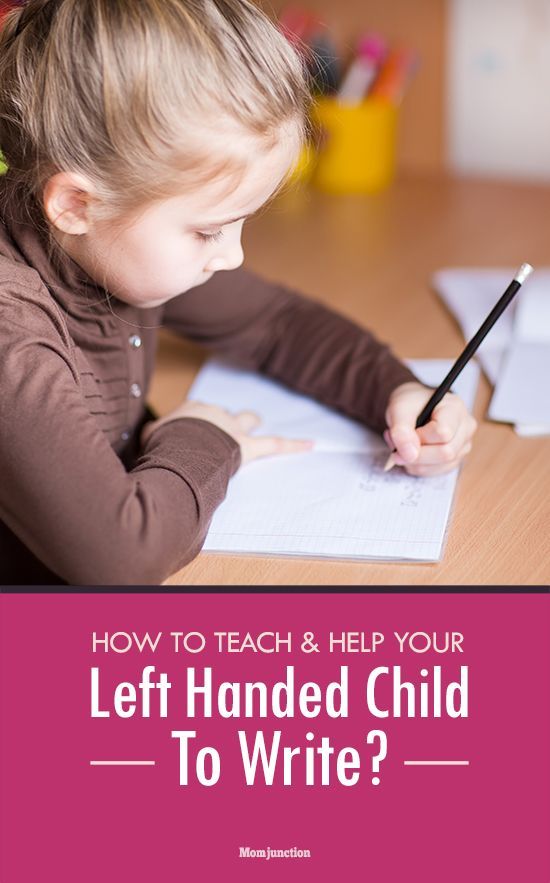 nine0004
nine0004
Of course, we want the child to be well acquainted with the classics. But the school curriculum offers, for example, Radishchev's Journey from St. Petersburg to Moscow. As a result, reading difficult, obscure works, and even written for adults, and more than two centuries ago, can completely discourage the novice reader.
6. Read the work in advance, before it is analyzed at school.
Quite often, in literature lessons, one chews and analyzes a work for so long and boringly that one becomes sick of it. After all, a work is often dissected as if the task of a school course is to prepare literary critics. nine0003 Therefore, it is better for a child to read, for example, "Crime and Punishment" as a detective story, and only then they will take it to pieces in the lesson.
7. Read the story at the same time as your child.
When your child needs to read a large, serious work, such as War and Peace, start reading with him at the same time.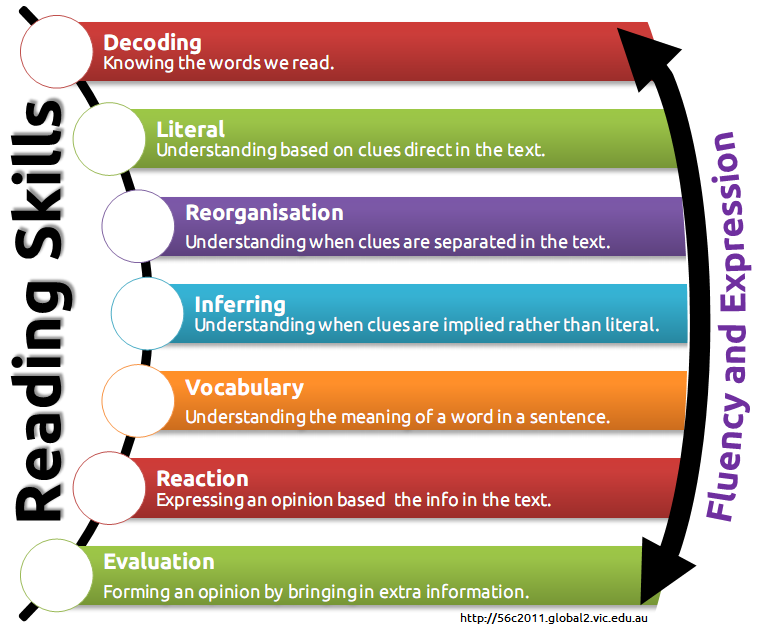 You yourself will enjoy, perhaps missed in your school years for the above reasons, and get closer to the child, become like-minded people. Share with him your findings and thoughts, explain difficult places. nine0004
You yourself will enjoy, perhaps missed in your school years for the above reasons, and get closer to the child, become like-minded people. Share with him your findings and thoughts, explain difficult places. nine0004
8. Organize a reader contest.
You can organize such a competition in your child's class, or invite his friends to join it. We do this in our Courses "Managing the Future" - in trainings for children and teenagers. Offer the children a list of interesting books and announce a competition with an attractive prize, which should take place, for example, in 2 or 3 months. The first place will be taken by the one who read the most and was able to answer questions about the books. And let the rest get consolation prizes. nine0004
9. Get a reader.
Preferably with minimal opportunities to play games. Then you will always have interesting books with you. And at any time - in transport, in line - you can read to your child.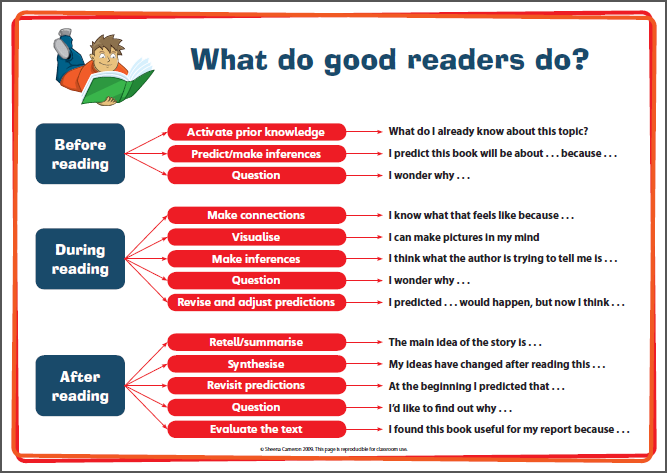 And when he wants to - give this useful entertainment to him.
And when he wants to - give this useful entertainment to him.
10. Never use reading as a punishment or condition for something else .
You can't say to a child: "You'll read the chapter, then I'll let you watch TV." This will teach the child to think that reading in itself is an unpleasant process. Reading should only be mentioned in the context of pleasure and interest. nine0004
I wish you exciting reading together!
Galina Dyatlova
Home
7 tips on how to help your child fall in love with reading (voluntarily!)
For one child, a book is really the best gift, while another will cringe at the sight of another volume. They force you at school, now at home too. But you don’t need to force it, even a school reading list for the summer. How to really captivate a child with books - says a specialist in children's reading and writer Yulia Kuznetsova. nine0004
1. Do not force your child to read
The desire to read is formed from within, so I am sure that forcing a child to read at five or six years old is a dangerous path.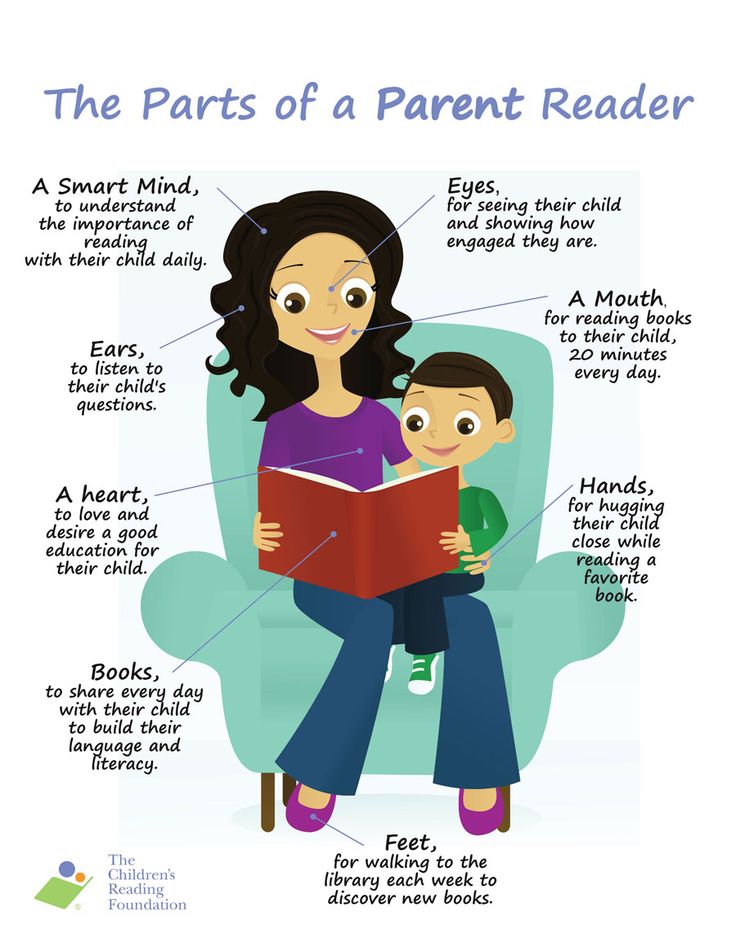 The word "should" should be applied to children's reading in general with caution and at a more serious age, from grade 5-6 and only in relation to school literature.
The word "should" should be applied to children's reading in general with caution and at a more serious age, from grade 5-6 and only in relation to school literature.
If a child does not feel like reading himself, there is nothing wrong with that. My middle son did not take reading aloud until he was three years old. While I was reading to my eldest daughter, he was crawling around on the sofa, pinching our hair - it only annoyed me. Then suddenly, at the age of four, he fell in love with reading aloud. At the age of five, we began to teach him to read, at first he did not particularly like to do this either. And by the age of six, reading began, this is a spontaneous process. nine0004
Parents are often afraid that their child will go to school without being able to read. It all depends on the teacher. Now I hear about cases when teachers say: “I don’t need parents to bring the child to some level, otherwise he will be simply bored in the lessons.”
2. Surrounding children with books is good advice, but it doesn't always work
My experience is quite different.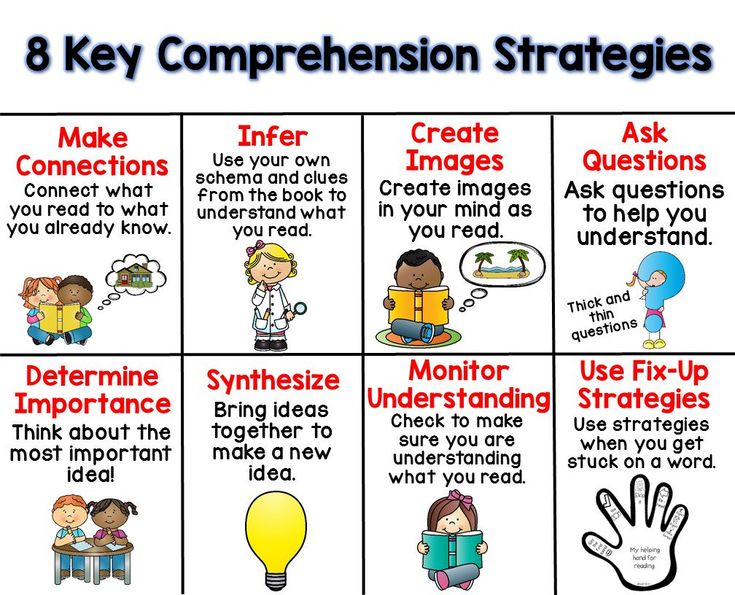 When I came back from book festivals and brought bags of books to children, we had the following dialogue: "I brought you gifts" - "What gifts?" - "Books" - "I see, but did you bring normal gifts?" nine0004
When I came back from book festivals and brought bags of books to children, we had the following dialogue: "I brought you gifts" - "What gifts?" - "Books" - "I see, but did you bring normal gifts?" nine0004
When there are many books in the family, the following stories may come up. You ask: "Do you want to read a book?" - "Not". They closed the book and put it in the fridge. After a while, you ask again, you get the same answer, and you put the book on the windowsill. It turns out that these “I don’t want” lie all over the apartment.
It seems to me that we should remember our book experience, when in childhood there were always not enough books. Especially the ones you really wanted to read. I run courses for children where we do group calculations, we have our own library that fits on a chair. These are books from my home library that have gone through a rigorous selection: they will definitely appeal to children who do not like and do not want to read. Children come, sit down, see some books, they are interested in taking them and looking at them, but I don’t let them do it. They say, “Please, please, can I? If I don’t take it now, then Petya will take this book later.” I say: "No, now we have a lesson, we are doing other interesting things." And when they see that the books cannot be freely approached, then after the lesson they scatter in a second. A mob runs up, they take everything apart and take it home. Moreover, the children know that next time I will ask what this book was about. nine0004
They say, “Please, please, can I? If I don’t take it now, then Petya will take this book later.” I say: "No, now we have a lesson, we are doing other interesting things." And when they see that the books cannot be freely approached, then after the lesson they scatter in a second. A mob runs up, they take everything apart and take it home. Moreover, the children know that next time I will ask what this book was about. nine0004
3. Talk with your children about the books you read yourself
Parents who read in front of their children are very rare. Use these moments to talk to him about the book you are reading right now, or even try reading out snippets. For example, my daughter once loved sheep very much, and I was reading Sheep Hunt by Haruki Murakami just at that time. When she found out about this, she said: “Sheep are being killed there, I feel sorry for them.” I offered to read a fragment of the book aloud to her so that she would see that no one was being killed there. I read the description of the pasture to her, and she was so delighted: her mother let her touch her book. nine0004
I read the description of the pasture to her, and she was so delighted: her mother let her touch her book. nine0004
You can discuss books with other adults in front of children. I discuss books on the phone with my mother
We have similar tastes, my mother likes modern Russian women's prose, for example, Marina Stepanova. We call her and discuss some books, and the children hear it all.
4. Read aloud. And record the reading on a voice recorder
Parents spend the whole day at work, and if after that they read aloud to their children for at least ten minutes, this becomes a powerful lock that holds relationships together. You can also not only read aloud, but also record reading on a voice recorder. The phone is not suitable for this, because it will switch attention to itself all the time. There is only one button on the voice recorder - turn it on and off. nine0004
Dad sits down, reads aloud to them, all this is recorded on a dictaphone. One chapter in a children's book lasts an average of 10-15 minutes, this time is enough for the event called "evening reading" to take place. When dad leaves for a business trip, the children listen to the recordings. They turn it on when they eat, when they draw. This is not just a text, this is a memory of how good it was with dad in the evening.
When dad leaves for a business trip, the children listen to the recordings. They turn it on when they eat, when they draw. This is not just a text, this is a memory of how good it was with dad in the evening.
5. Don't ignore audio books - they help with text
Audio books are a relief for children who are not very confident and see mostly letters, not images. They first get used to, and then return to a paper book. This mechanism also works with films (yes, yes). Children first watch the movie, find out how it all ends there, and then take the book and read it. It happens that children take the book even after performances. The host of the theater studio told how she staged "Uncle Vanya" with teenagers, and then a boy came to her and asked: "Is it possible to read this somewhere?" So a well-read audiobook, especially if you listen to it with your parents and discuss the plot, can also help instill a love of reading. nine0004
6. Write a book about your child - this is another way to help him start reading
Take a picture or draw your child, stick it on a piece of paper and write: "This is Kolya.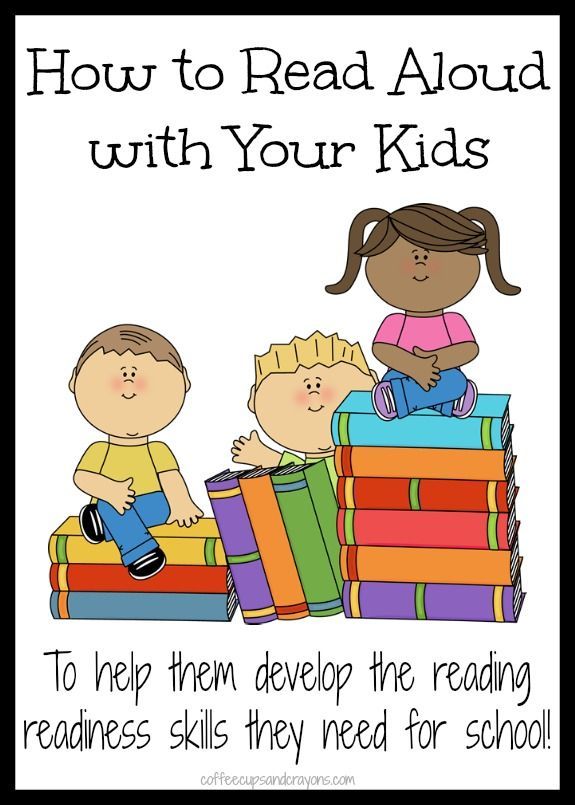 " Then take a picture of how he eats and write: "Kolya eats." Then you can take a picture of how he sleeps, plays, and so on. Make such a book and show a child at the age of three - let him look at all this. When he is four years old, he will understand that letters can somehow be put together into words and will start trying to do it. Reading about yourself is always more interesting. My daughter is 12 years old, and she sits down with pleasure herself and reads a book about what she did nine years ago: she sculpted hedgehogs, kneaded the dough, molded cookies from it. nine0004
" Then take a picture of how he eats and write: "Kolya eats." Then you can take a picture of how he sleeps, plays, and so on. Make such a book and show a child at the age of three - let him look at all this. When he is four years old, he will understand that letters can somehow be put together into words and will start trying to do it. Reading about yourself is always more interesting. My daughter is 12 years old, and she sits down with pleasure herself and reads a book about what she did nine years ago: she sculpted hedgehogs, kneaded the dough, molded cookies from it. nine0004
In my lessons I take 15 minutes and we write a book about ourselves. I give simple phrases that need to be completed: "Once I went ...", "And suddenly I saw ...", "Here I meet ...". It takes a little time, but it works very well. Children can write whole volumes about themselves.
In fact, for students who have difficulty in reading, it can be like writing classes - this is a good way to overcome reading difficulties.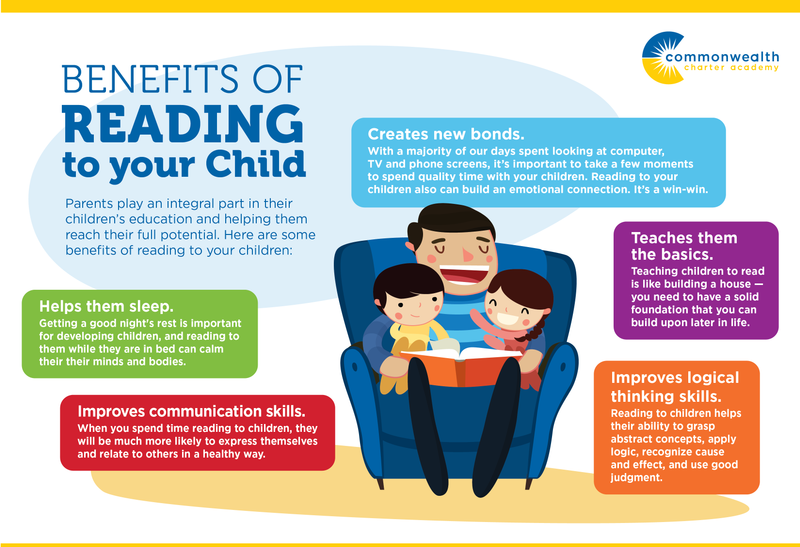 It seems that the child is learning to write, but at the same time learning to read. I had a girl on the course who stuttered and skipped words when reading. But when I read my text, I did not miss a single word. For her it was very important. nine0004
It seems that the child is learning to write, but at the same time learning to read. I had a girl on the course who stuttered and skipped words when reading. But when I read my text, I did not miss a single word. For her it was very important. nine0004
7. Do not be afraid that the child will not read the school list of literature for the summer
Take the list of literature, a pen and first of all cross out the books that the child definitely does not need. During communication with the teacher, you can understand what he wanted, including this or that book in the list. For example, in the first grade in our textbook there was a fragment from The Hobbit. The teacher decided that since there is a piece from Tolkien, then you need to read the whole book. I say, "Sorry, guys," and cross it out. We tried to watch a movie based on the book, but the children didn't get it: they were just scared. nine0004
Then cross out all the books that the children know by heart. In the first grade, along with The Hobbit, we came across Little Red Riding Hood.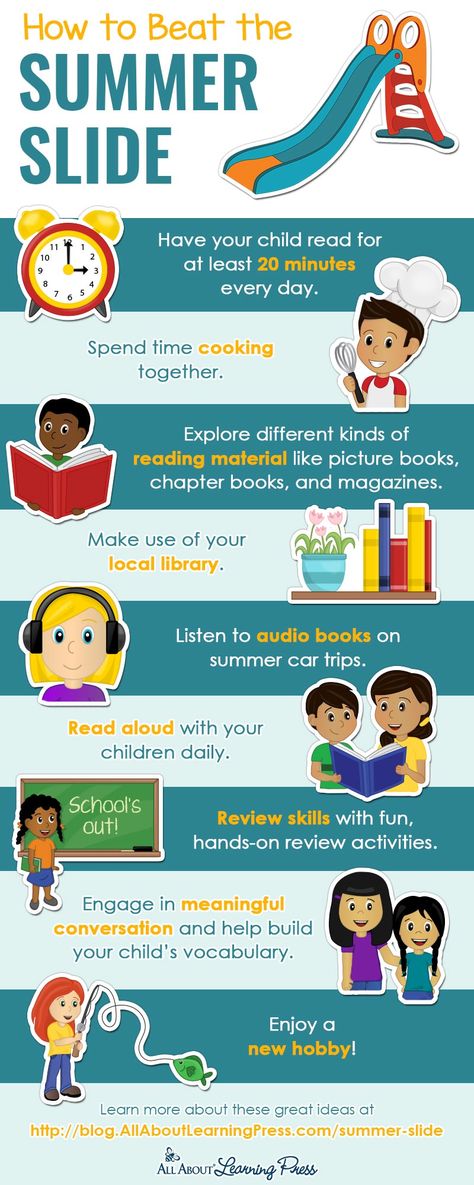 I crossed out this book because we know it very well. Next, we select books that can be replaced with audiobooks and films. If the child is not drawn to reading Pinocchio, just show him the film. The plot will be postponed, and when the text from the book comes across to him in the textbook, the child will cope with it, because he will be six months or a year older.
I crossed out this book because we know it very well. Next, we select books that can be replaced with audiobooks and films. If the child is not drawn to reading Pinocchio, just show him the film. The plot will be postponed, and when the text from the book comes across to him in the textbook, the child will cope with it, because he will be six months or a year older.
Then choose the books you will read aloud. It was the same with Garin-Mikhailovsky's The Childhood of the Theme. My daughter got it in the second grade, and I realized that she would not pull it. nine0004
There remains a small sample of books that the child can read on his own. You take this list and say: “Look, here the teacher recommended these books. Which of these would be the most interesting for you to read?”. He chooses and you start reading. One summer, our son read one or two books, but at the very least, we replenished our cultural baggage. Often parents are afraid that they will come to school in September and they will be asked if the child has read the entire list.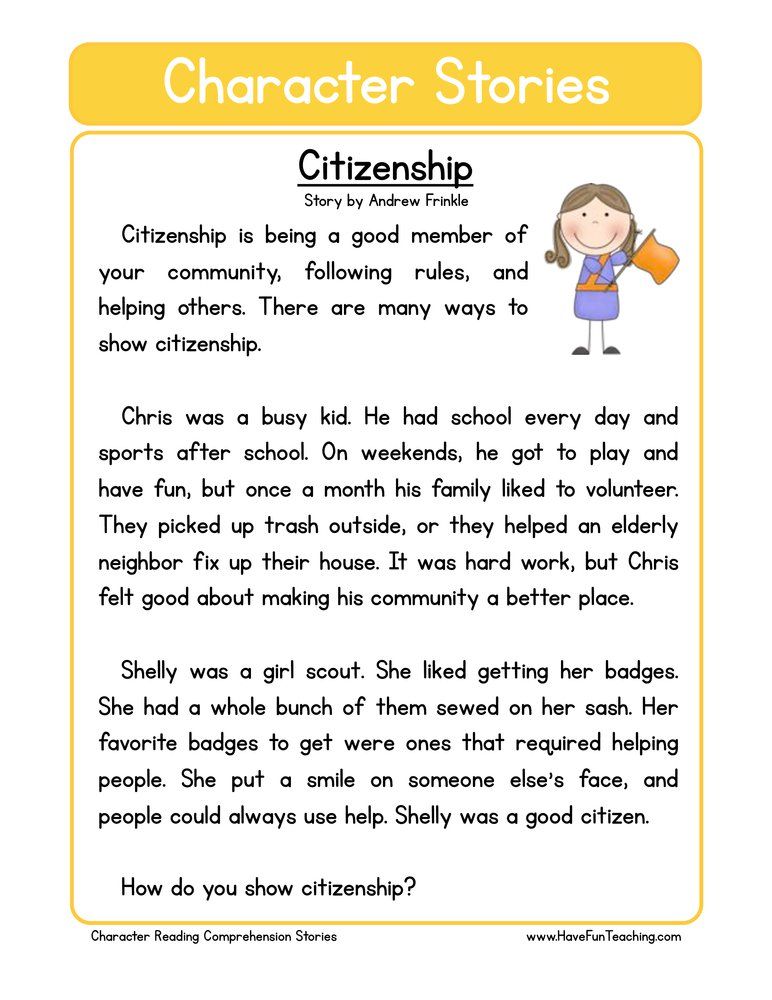 Just answer that you didn't read everything. There is nothing terrible in this. nine0004
Just answer that you didn't read everything. There is nothing terrible in this. nine0004
What else to read about children's reading:
- Marina Aromshtam "Read!" - a book that will give parents answers to many questions.
- Yulia Kuznetsova Calculation. How to Help Your Child Love Reading is a book about how parents can help their children love books.
- Aidan Chambers “Tell me. We read, think, discuss” - the author tells how to communicate with children through books. What questions can be asked to children so that they talk about what they read and at the same time do not feel that they are being examined ( an excerpt from the book read here ).
- Daniel Pennack "Like a Novel" - for parents who worry that their child does not read.
- Papmambuk - is an excellent site with useful materials about children's reading.
Listen to the full interview with Yulia Kuznetsova here.


